We have all probably seen a cat hiss; when they come across an unfamiliar face or when they are stressed or when they are “fighting” with other cats, well, at least that’s what it looks like, right?
But do you see your cat hissing more than frequently? It might have got you concerned about how often your cat hisses at you, or at other pets, or even guests?
And if you are a cat parent, you might be worried about your cat hissing behavior as something uncommon. However, it is not uncommon, or is it?
Let’s find out the reasons why cats hiss!

What Causes Cats to Hiss?
So, what is the reason behind your cat’s hissing behavior?
Well, cat hissing, in human language, we’ve learned to recognize it as a sign that a cat is truly not in the mood for playtime or cuddles, but there are other reasons that can cause this behavior.
And if you are wondering what is causing this snake-like noise behavior in your cat, we have put together a number of reasons in this post.
Go through these reasons to see if you can narrow down the prospects, likewise, don’t hesitate to take your pet to the vet if you think she needs medical attention.

Here are eight reasons to look out for when you want to understand why your cat might be hissing!
1. It’s a Warning Sign
Cat hissing is usually regarded as a warning sign in human language. However, cat hissing is considered a defensive gesture in cat language. And this type of behavior is commonly exhibited by cats who are feeling antagonized, victimized, or threatened by an animal or when a new person enters your house.
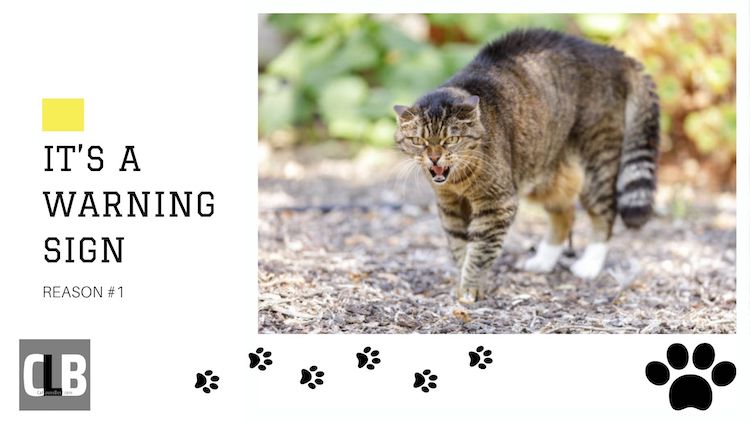
For felines, a hiss, or even a yowl, is part of their way of communication. Some cats may start hissing when an unfamiliar person goes near them or holds them. It can be seen as a warning, and if you provoke the cat, she might attack. The cat might just be trying to say, “back off, buddy!” by hissing.
2. Hissing Out of Stress
On the other hand, hissing in cats can be due to stress. There are several things that can lead to a stressed kitty cat, to name a few — such as, unfamiliar environment or dealing with a new pet in the house.
Cats cannot handle stress well enough, plus, they cannot express the same way humans do. Moreover, most cats tend to flee such unfamiliar situations, while some other cats would go into full defensive mode and start hissing.
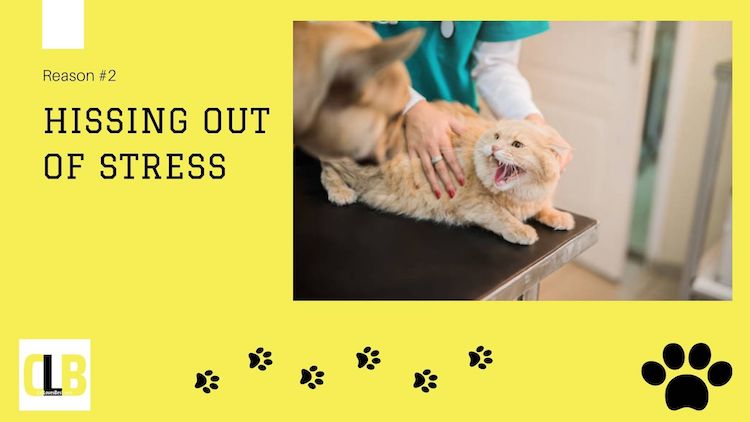
Further, noise can also cause stress to cats, and so can traveling in a car in a cat carrier can cause stressful behavior. Noise can disrupt your cat’s sense of normalcy, and this will make her feel threatened.
3. Scared of Unfamiliarity
Cats feel safe when they are in familiar surroundings. But when they are introduced to an unfamiliar setting or any unfamiliar object in the house, this can be another reason why your cat may randomly just start hissing. Likewise, some cats hiss at people that seem unfamiliar to them.
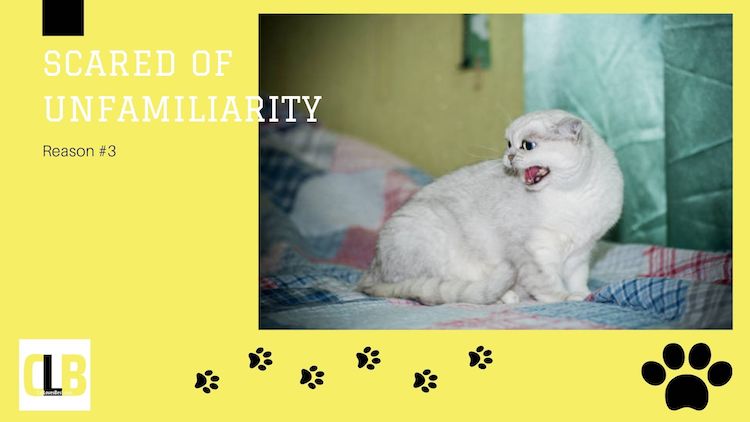
Even introducing a new toy to your cat can cause her to feel anxious. And if this happens, then you will need to gradually introduce new items into your home to help your cat get used to them. Within time, the hissing might decrease as your cat feels more comfortable in the house with its inhabitants.
4. She Is Protective of Her Kittens
Like any other mammals, female cats are quite protective of their kittens. Mother cats may start hissing at someone or any animal that comes too close to her kittens.
Moreover, some highly sociable cats may not even let you near the kittens, as they are highly sensitive in those matters. And continuing to approach a mother cat who is in such a situation is likely to precipitate an attack on you.
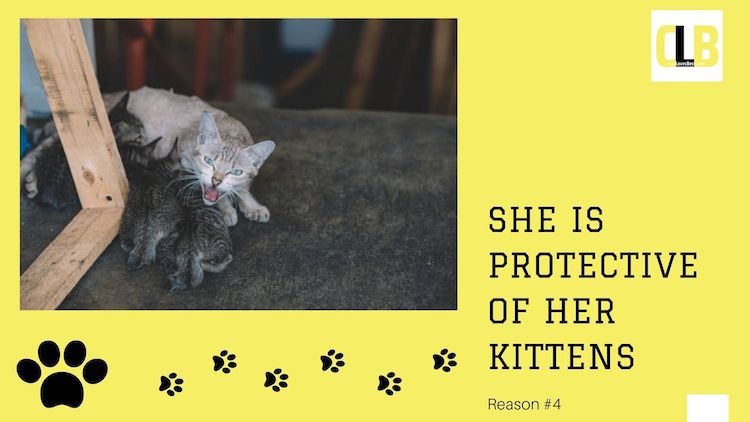
On the other hand, sometimes mother cats may also hiss at kittens as a “teaching tool.” It is to let the kitten if she is scratched or bitten too hard during play. Although not all sounds between felines are bad, you should keep an eye on them, you don’t want them to get hurt.
5. Showing Dominance
Sometimes cats like to show dominance to other cats in the form of hissing. Since cats are territorial, they have their own specific spaces, and they do not like when it gets invaded by any other animal or cat, or kitten. Cats would then start hissing, and use it as a tool of intimidation.
This type of behavior is mostly seen in male cats than female cats. Likewise, this type of aggression in cats usually involves the much-ritualized body posturing, stalking, growling, staring, yowling, and howling.
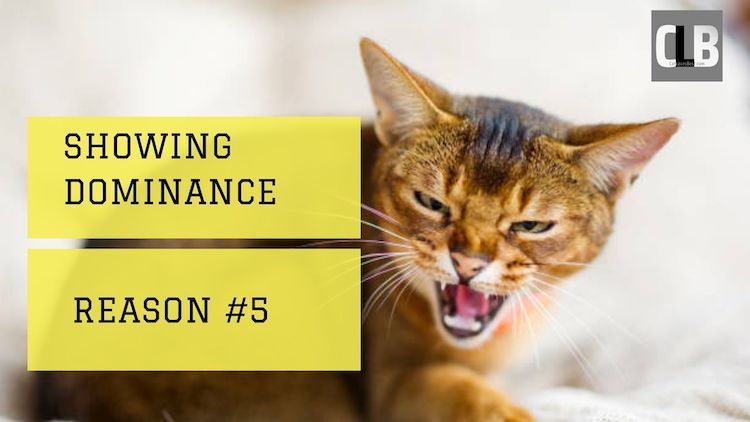
Further, un-neutered male felines on the edge of starting a fight with other felines hiss loudly to show their dominance and irritation at one another’s presence.
6. She Is Annoyed
Even the calmest of cats may start hissing at some point, it’s because the cat is just annoyed. If you do something that your cat does not like, such as forcing her to get into the cat carrier, chances are that she will get annoyed and start hissing.
Or she is annoyed because she did want to be petted at the time, or it may be because you’re trying to pick her up when she doesn’t want to. Likewise, keeping your cool and leaving your cat alone for some time conveys to your cat that there is nothing to worry about, it can help your cat to chill out.
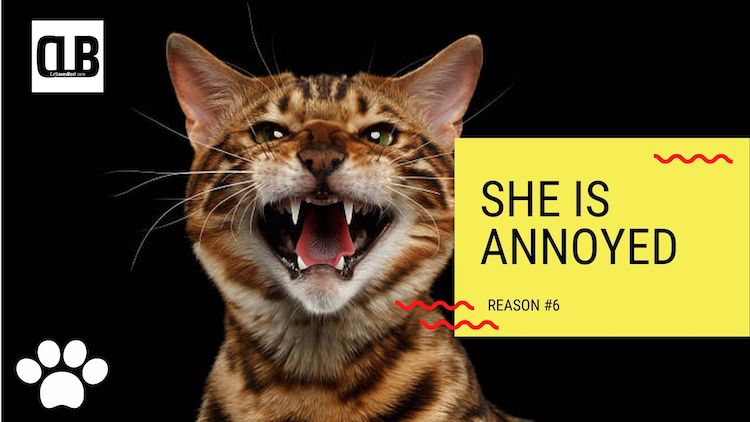
Besides, this behavior can also be the reason if you have kids in the house annoying the cat who doesn’t understand when to leave a cat alone. It’s best to monitor such behavior near kids, as the cat may scratch them.
7. She Is Not a Fan of Rough Play
One of the reasons behind a hissing cat could be down to rough play. While playing, some cats may feel tensed or bullied around each other because they are “play-fighting.” In such situations, cats may avoid each other, or start hissing at each other when the other cat is playing too rough with them.
The same can be said with cat owners. As, unfortunately, playing with cats can sometimes escalate beyond simple ‘play’, and your cat may start hissing at you. And if she keeps hissing repeatedly, this may be a sign that the ‘play’ has gone beyond ‘play’ and come into the area of aggression.
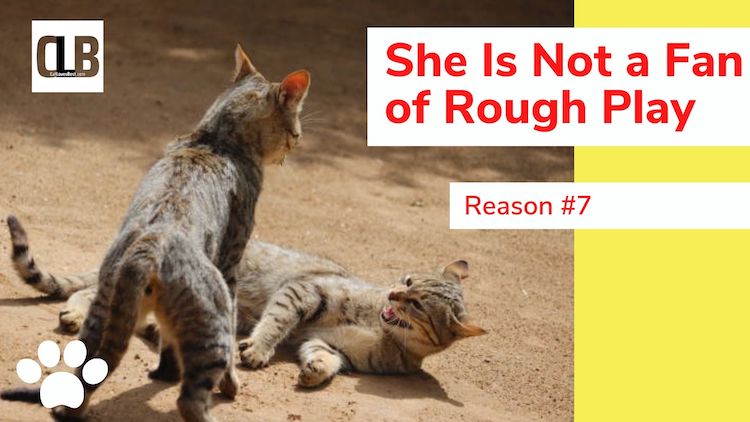
However, the best way you can keep her calm is by not scolding your cat, but rather by giving your cat some space to calm down on herself.
8. Your Cat Might Be In Pain
At last, if there is no sign of stress or fear in your cat, then the reason behind her hissing could be an underlying illness. You can make out that it is an illness if the hissing is more frequent.
Although hissing in cats due to physical pain is rare, but it is not unheard of, especially if you are touching your cat in some specific area, and she starts hissing out of pain.
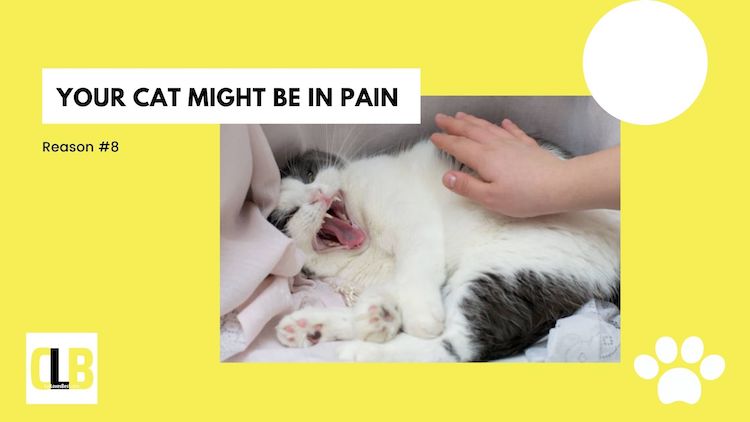
It’s important that you have your vet take a look at her, he will examine your kitty to find out any underlying medical problems, such as arthritis. Moreover, other conditions, such as hyperthyroidism and nervous system disorders, can also lead to hissing behavior.
Conclusion
Cat hissing is considered normal behavior, and people often say that it resembles the hissing sound of snakes — a warning sound to keep the predators away.
While there can be several reasons why cats hiss, such as when your cat is in pain, or when she is protective of her kittens from other people, or when she is just stressed.
However, if your cat is hissing a lot, then there might be something wrong with your kitty. In such situations, consulting a veterinarian for veterinary advice can be a good idea.
References
- Cat communication — Wikipedia
- What does cat hissing sound like — PetMD
- Why do cats hiss? Is my cat upset? — Purina

